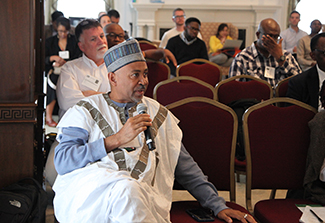Bioethics researchers meet at NIH to reflect on the past, look to the future
July/August 2023 | Volume 22 Number 4
 Fogarty International CenterDr. Shehu Usman Adamu from the National Open University of Nigeria asks a question at the 2023 Fogarty bioethics network meeting.
Fogarty International CenterDr. Shehu Usman Adamu from the National Open University of Nigeria asks a question at the 2023 Fogarty bioethics network meeting.
During their first in-person meeting since 2019, staff and grantees from more than 30 Fogarty-funded bioethics programs met at the Stone House on the NIH campus to discuss the history, current state, and future goals of their individual programs and the
Fogarty International Bioethics Training Program.
The Fogarty program supports education and research training to develop ethics expertise in low- and-middle-income countries (LMICs) through collaborations between U.S. and LMIC institutions. These partners develop bioethics doctoral and postdoctoral research training programs that incorporate didactic, mentored research and career development components to prepare trainees for positions of scholarship and leadership at health research institutions in LMICs. The program also supports master's level and skill development training courses, practicum experiences, and mentorship opportunities.
Dr. Robyna Khan of Aga Khan University in Pakistan shared details about the recently funded
Bioethics Capacity Building Program in Pakistan. This program has developed 11 new bioethics training courses in the past year and has also published a casebook titled "Bioethics in Pakistan: Local Contexts, Local Cases."
Later, Dr. Troy Moon of Tulane University presented to the group an update on the
UEM Collaborative Research Ethics Education Program at Eduardo Mondlane University in Mozambique. The program, created in response to the projected growth of research activity in Mozambique, aims to train the next generation of researchers in ethical research and strengthen capacity in the local system for ethical review of human research protocols while also building a network of bioethics educational resources with other Portuguese-speaking African nations.
Dr. Emily Anderson, the principal investigator of the
Loyola-Ukrainian Catholic University Bioethics Research Training Program, credited the grit and determination of her trainees, along with Fogarty’s support, for keeping the program afloat and growing despite the ongoing war. They currently have 10 trainees in the program, four of whom joined in 2023.
Nalini Anand, JD, director, and Blythe Beecroft, global health research and policy analyst, of the
Center for Global Health Studies (CGHS) at Fogarty, presented the results of a recent Fogarty request for information on equity in global health research. The responses covered issues such as limited funding opportunities for LMIC investigators, administrative burdens, differences in research priorities between funders and LMIC institutions, among others. The
full report is available on the Fogarty website.
Other presenters included Rene Sterling from
NHGRI's Ethical, Legal, and Social Implications Research Program, Dr. Michael Parker from the Oxford Ethox Centre and Global Health Bioethics Network, and Dr. Dan O'Conner from the Wellcome Trust, who discussed different grants and funding opportunities for bioethics research.
The last day of the meeting allowed the group to reflect on how the bioethics program came to be, and how it can be improved in the future. Attendees discussed the last evaluation of the program and potential new goals for the next 10 years, emphasizing the importance of local control and input in research ethics issues and projects.
Program director Dr. Barbara Sina said, “We started this program with the goal of including the LMIC voice in the conversation around bioethics, and while we've made headway in this area there is still much work to be done."
Biomedical research technology will only continue to change at an ever-more rapid pace, making bioethics research increasingly important. As Acting Fogarty Director Dr. Peter Kilmarx said in his opening remarks, “With issues like genomics research and artificial intelligence growing every day there’s job security in ethics research and Fogarty will continue to be supportive of that.”
More information
Updated: August 15, 2023
To view Adobe PDF files,
download current, free accessible plug-ins from Adobe's website.
Related Fogarty Programs
Related World Regions / Countries
Related Global Health Research Topics